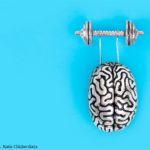Most of the time, we remember things experienced in the past:
My most recent birthday
A childhood vacation
An obscure factual tidbit from the news
However, we also spend some time remembering the future:
An errand to complete on the way home from school
A phone call I have to make this evening
A coffee date this weekend
When we remember the future, we’re using our prospective memory.
Here’s why this distinction matters:
Schools focus primarily on remembering the past: the topic or formula students learned last week, class rules, concepts and skills from a previous unit.
We also spend a fair amount of time relying on prospective memory.
Students remember the third step of the instructions while they do the first. That’s prospective memory.
Teachers remember an announcement that we should make at the end of class. That’s prospective memory.
What can research tell us about this under-discussed cognitive capacity? And, does any research provide practical classroom advice?
Start with the Basics
We know (all too well) that remembering the past can be difficult. After all, students regularly forget the ideas they seemed to know so well just last week. (Let’s admit it: we do too.)
Perhaps we’re not surprised to learn, therefore, that prospective memory creates cognitive strain. Simply put: we don’t remember the future very well either.
Have you ever driven home and forgotten to pick up milk on the way?
Have your students ever forgotten the 3rd instruction while working on the first?
Yup: we struggle to complete prospective memory tasks.
I myself think of this problem as (basically) working memory overload.
After all, working memory selects, HOLDS, reorganizes, and combines information from multiple sources.
Prospective memory requires us to HOLD that information for a long period of time — and thus strains working memory.
Simply put: when we ask students to use prospective memory, we increase working memory load and thereby make learning harder.
Sound familiar?
Problems Require Solutions
Teachers are a practical lot. Once we learn about a problem, we’d like a solution.
Happily, we have some steps to follow.
Step #1: recognize the problem.
If I tell my students five steps to follow, I’m creating a prospective memory problem. They must remember to do all five steps in the future.
Once I recognize the prospective memory load inherent in this task, now I know to change something.
Step #2: rely on long-term memory.
If students have routines in long-term memory, they don’t need to HOLD them in working memory.
So, if I always stop at the grocery store as I drive home on Wednesday, I’m much less likely to forget that errand this upcoming Wednesday. It’s part of my routine.
If students always start by circling the verbs in a sentence, they’re much less likely to be stumped by instructions that begin with that task.
Simply put: routines reduces prospective memory load.
Step #3: Recent Research
Today’s blog post was inspired by a recent study about prospective memory, led by Dawa Dupont. Specifically, the study wondered if we can reduce prospective memory load by writing down information we will need in the future. (IMPORTANT NOTE: I’m oversimplifying here — I’ll come back later to the definition of “writing down.”)
This three-part study came up with several answers.
Answer #1: YES. When we write down important information, doing so reduces prospective memory load. Students remember it better.
Answer #2: SURPRISE: writing down important information helps us process less important information as well.
By reducing prospective memory (working memory) load, we help both complex and simple cognitive processes.
Answer #3: Re-SURPRISE: when students can’t write down important information, this limitation harms recall of important info more than recall of less important info.
In other words: in prospective memory, we often get priorities wrong.
All these answers lead to a helpfully straightforward solution to prospective memory problems: let students write stuff down.
That is: don’t just describe five instructions. Have students write them down. (Or, give them a written copy.)
Don’t try to remember the announcement at the end of class. Write in your lesson plan the announcement you need to make.
Simply put: offload prospective memory burdens onto paper — or some other technology reminder.
Important Definitions
I said above that I was oversimplifying when I said “write stuff down.” Let me now unpack a bit more complexity.
In this study, participants played a simple video game.
In some versions, players could mark objects in a special way. This marking reminded players what to do with those objects in the future.
In other versions of the game, players couldn’t create those reminder marks.
Those special markings were, in effect, a technology strategy for “offloading” prospective memory. Players didn’t have to remember “move this one to the left” in the future. They had already put in a reminder marker to do so.
In other words, players didn’t exactly “write stuff down.” They created a kind of technology reminder.
However — this is important — the first sentence of this study suggests that “writing stuff down” and “creating a kind of technology reminder” serve the same prospective memory function:
Individuals have the option of remembering delayed intentions by storing them in internal memory or offloading them to an external store such as a diary or smartphone alert.
Researchers didn’t study the “written diary/calendar” option here, but the logic is very much the same.
Even More Important Definitions
I’m being quite transparent about these definitions because I worry that other sources are extrapolating too far.
I found Dupont’s study by following this headline: “Using smartphones could help improve memory skills.”
Um, what?
If students use their cellphones to write down their homework, or take pictures of instructions I’ve written on the board, or do some other task-focused activity, doing so could reduce prospective memory load.
But:
First, that’s not at all the same thing as “improving memory skills,” and
Second, having cellphones handy in class can produces all sorts of other distractions. I mean, are students honestly using cellphones for “task-focused activities”?
True confession: more often than not, my students aren’t using cellphones for good. (I had one student answer his phone in class. No, really.)
So, I think Dupont’s study supports cellphone use in class only in narrowly defined ways. In no way does it generally support the idea that cellphones are good because they “improve memory skills.”
TL;DR
Prospective memory allows us to remember the future (yay). And, it creates working memory load (boo).
We can reduce that load by a) recognizing the problem, b) developing classroom routines, and c) creating reminders — written or technological — to offload those prospective memory burdens.
Anyone who says this research broadly supports cellphone use in classrooms is — in my view — dramatically misrepresenting its conclusions.
Dupont, D., Zhu, Q., & Gilbert, S. J. (2022). Value-based routing of delayed intentions into brain-based versus external memory stores. Journal of Experimental Psychology: General.





I appreciated the article about memory overload and the tips I can pass on to my students.
I disagree with the very brief personal view of cell phone usage in a classroom, and you only cited one study.
I have allowed students in my classroom to use cell phones after I informed them of the consequences (both good and bad) if they chose to use their smartphones. The vast majority of my students used their phones responsibly to help with their classwork. The ones who chose to abuse the privilege were ratted out (for lack of a better term) by their fellow classmates and they lost their cell phones according to our school and classroom rules. With clearly stated rules, guidelines, and consequences cell phones are another tool to help students achieve success in school. If you’re going to make statements, please do more than just use one study and one personal opinion in writing.